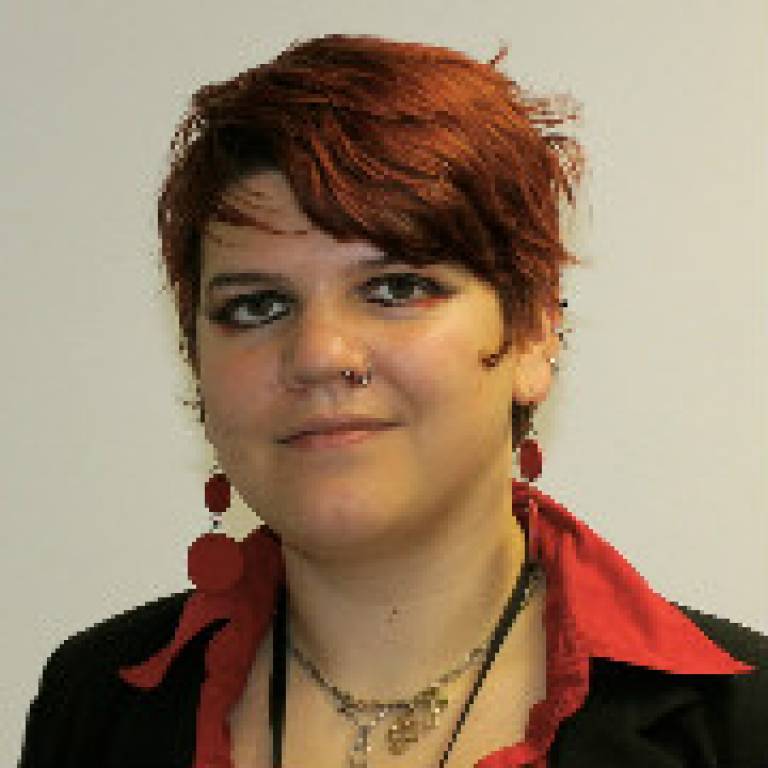Spotlight on Kate Oliver
1 September 2011
This week the spotlight is on Kate Oliver, Communications, Marketing and Events Manager for the Faculty of Engineering.

What is your role and what does it involve?
In broad terms, I show off the excellent work that is done in the faculty - all nine departments, from Electronic and Electrical Engineering to Security and Crime Science - to everyone who should know about it. Specifically, that involves reading journal papers, writing news for the website, organising school visits, taking photos, filming students racing, coming up with ideas for art around the buildings... I do everything that I can make time for!
My
favourite aspect of my job is cornering researchers and learning about what
they do - I am a knowledge magpie. But the hard bit is putting it into forms
that different people can, or more importantly will want to, understand.
Whether I'm talking to funders, industry partners, prospective students, or our local community, I need to inspire them with the right words, pictures and actions to make what we do come through true and alive. I'm an infection vector for enthusiasm.
How long have you been at UCL and what was your previous role?
I took up my role at UCL in June, which brings me full circle after years of flitting between different media to talk science.
Way back when, I started as a physics student at UCL - but during my
Master's degree I began to write for science magazines and websites. I've been
doing that continuously since - you still might occasionally see my face next
to articles in Physics World or The Sky At Night magazine.
I've been jumping around since, doing things like working as an assistant press officer for the European Synchrotron Radiation Facility in Grenoble, France, writing content for a website to promote maths education and the use of maths in careers, and most recently researching for the BBC. The programme I worked on was called The Code, which describes how maths underlies the structure of the world, stars Marcus du Sautoy and can probably be found on iPlayer now (depending on when you read this).
What working achievement or initiative are you most proud of?
While I was working at the ESRF in Grenoble, we were upgrading our
facilities at the same time as the World Conference of Science Journalists was
happening in London. This, we decided, was an opportunity not to be missed and
we arranged a trip for people coming in from six continents to tour the big
science labs of the Alps (yes, there's more than one - there's also synchrotron
and the world's most intense research neutron reactor) after the conference.
This required massive amounts of organisation - the travel arrangements alone got quite Byzantine, but there was also a need to prepared background dossiers for the journalists on the science that they were going to see.
When it came to the tour, I was delegated to travel with the journalists through several countries, explaining the organisation, findings and suchlike in two languages. As well as being demanding, the tour was very successful in raising our international profile, generating articles all round the world - from the Côte d'Ivoire to Argentina. Our guests thanked us sincerely for our efforts and invited us to visit their home countries, and most importantly were left knowing about all of the Alpine research labs.
What is your life like outside UCL?
Busy. I've
been learning to play drums for a year and a half now, and I'm in a straight-up
rock and roll band - we're musically untalented but we try hard. I have a drum
lesson once a week, band practice once a week, and occasionally I gig around
London.
If there's any strength left in my arms, I eradicate it with weekly training in Wing Chun Kung Fu, a Southern Chinese fighting style that relies on getting in close and delivering multiple strikes. I am, however, not very good at it, and have a bad habit of skiving training, which doesn't help.
To
supplement all that aggression, I write my blog, www.schrodingerskitten.co.uk
(yet more science) and draw pretty pictures. For certain values of pretty.
 Close
Close

